[Click on BLUE links for sources and more information]
Wise old farmers have long had a saying: Don’t eat your seed corn. In simple terms, it means that every seed that comes through your hands has the potential to either be eaten or planted for next year’s harvest. You need to make sure that your farm always has enough seed corn to replant the fields on your land so you enjoy another harvest next year. If you eat your seed corn, you won’t have anything to put in the ground and you lose the farm.
Never forget this rule: Don’t sacrifice what you want for what you want right now. Never Spend Your Principal If You Want To Be Rich by Joshua Kennon at The Balance
One of the enjoyable parts of grandparenting is watching your grandkids grow up, watching them explore, learn about life and eventually (hopefully) learn what it means to be an adult. One of my grandsons at around 2 or 3 used to delight in throwing a box of his toys all over the floor. “Look at my mess!” he would exclaim and laugh. Then he would move on to another box or another activity leaving the mess for grandpa to clean-up.
Part of growing up is learning to share, learning that life is not all about you, that with freedom comes responsibility, and that “goods” are often accompanied by “bads”. The “bads” cannot be ignored if we really care about quality of life.
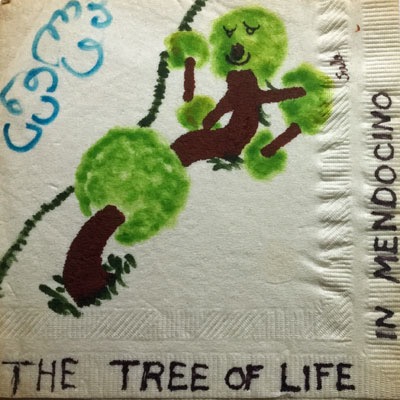
Sea Gull Cellar Bar Napkin Art, artist Sula Combs
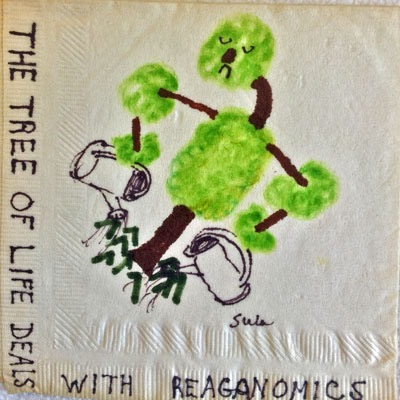
Sea Gull Cellar Bar Napkin Art, artist Sula Combs
In other words, we need to be aware of our messes. If someone doesn’t clean them up as we go along, they could become insurmountable, even explode out of control. Consider a manufacturing plant that spews toxic chemicals into a river in the process of its operations. Someone must pay to clean this up or others will pay in terms of reduced water quality and possibly increased health risks.
The Republicans have majorities in both houses of Congress and control (to an extent) the Presidency. They have a number of goals they want to accomplish and the President, desperate to log political wins during his term, is inclined to sign any legislation the Republican Congress sends to him.
What are these goals? Tax reform to specifically benefit the rich and corporations. Massive deregulation allowing corporations to throw their boxes of toys all over America while leaving the mess for others to clean up if they are cleaned up at all. Erecting walls to keep out immigrants. Turning our back on the rest of the world. And, appointing a platoon of judges to validate and consolidate these goals as they are achieved. I wrote about some of this in Trompudo’s Revolution.
This post focuses on deregulation. I expressed my views on the tax bill in a number of previous posts.
Welcome to the American Kleptocracy
Do We Really Need This Tax Cut, Just Askin’
The “goods” show up in the GNP and many traditional measures of the economy. The “bads”—pollution, riskier workplaces, investor fraud, resource depletion, environmental degradation and so on—will not show up unless they are measured. And, no one is likely to clean up the “mess” modern capitalism makes while producing the goods and services we demand unless we ask them to.
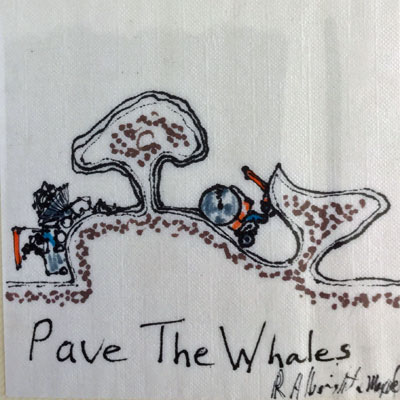
Sea Gull Cellar Bar Napkin Art, Richard Albright and James Maxwell artists
One way to “ask them to” is through government regulations. The business community generally hates regulations. They raise the cost of doing business.
It is incorrect to characterize the cost of government regulations as a “cumulative burden”. In many cases it is the cost of cleaning up the mess made by business, cost that would be born by the environment and the public if not by business.
It seems like $27 billion annually is a small price to pay to prevent a $22 trillion crisis. These numbers are estimates and may be far off but even still, the beneficiaries of deregulation are the stockholders of the banks, the losers will be the public when (not if) the next banking crisis occurs.
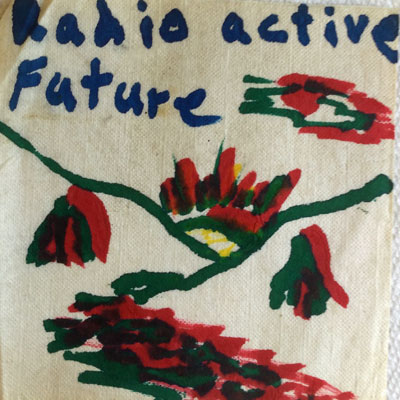
Sea Gull Cellar Bar Napkin Art, artist unknown
While some regulations may be unwise or unnecessary, the kind of massive rollback that is occurring under Republican control has a definite downside that even business recognizes.
I learned my economics (okay, it was fifty years ago) from a text by Nobel economist Paul Samuelson. Several editions later economist William Nordhaus took on the responsibility of keeping the text alive. He did so through 19 editions, the last edition in 2009. The last I purchased was the 12th edition. Along the way Samuelson and Nordhaus introduced a concept, Net Economic Welfare (NEW), that attempted to take into account the “bads” along with the “goods”. NEW was offered as a replacement for the conventional Net National Product used in measuring economic growth. The authors had this to say at that time.

Critics of economics have come forward to deplore materialistic concentration on the quantity of this or that. In the striking words of a young radical: “Don’t speak to me of all your numbers and dollars, your gross national product. To me, GNP stands for gross national pollution.”
What are we to think? Isn’t it true that GNP includes missiles and sulfur-emitting smokestacks along with bread and education? Must modern economics make a fetish of quantity at the expense of quality of life? Or can we correct the defects of the official gross national product numbers so that they better reflect the true satisfaction-producing products of our economy?
Yes, we can focus on quality as well as on quantity. In order to include the new realities with the old, we can correct the traditional GNP numbers. We can subtract the costs of the unpleasant features of modern urban living, such as dirty air and congestion. We can add the enhanced leisure enjoyed by our citizens, along with household services produced by wives and husbands. These losses and gains are ignored by government statisticians, but they need not be overlooked by economists!
And just such corrections have been attempted by economists. In order to correct for the excessive emphasis the GNP places on raw production, a different measure of economic life called net economic welfare (or NEW) has been proposed. The red curve in Figure 1-1 shows the average NEW per person in the United States. NEW has grown since 1929, suggesting that, even after correcting for pollution and congestion, true economic living standards have risen. But NEW has grown more slowly than GNP, which confirms our intuition that the dollars-and-cents of markets miss many important aspects of economic life … pp 4-5
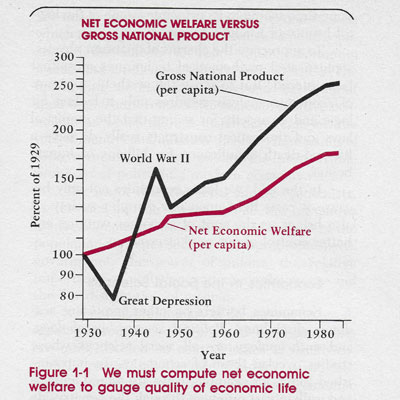
We see that NEW grows more slowly than GNP. This difference may be inevitable in a world that is becoming more congested and relies ever more heavily on large-scale power plants or sophisticated organic chemicals. By relying on more comprehensive measure of national output like NEW, society can keep its priorities more clearly in mind. Society does not need to be chained to mere material growth unless it wants to. The economy can serve broader goals—such as an appropriate balance between work and leisure, or a better use of resources to protect our environment—if these are what the people hold most important … p 119
From: ECONOMICS by Paul Samuelson and William Nordhauis, 12th edition
Much of the money businesses save from tax relief and deregulation is unlikely to be invested. Instead it will accrue to the bottom line and be reflected in stock price increases and higher pay for management. This was the awkward conclusion of a recent meeting between Gary Cohn, White House Economic Adviser, and the Wall Street Journal’s CEO Council.
According to a recent article in the Washington Post, the Trump administration is in the process of cancelling hundreds of Obama-era regulations. While they may not be successful in every case because of lawsuits and other setbacks, it is clear that the pace of deregulation has picked up significantly under President Trump. Businesses love it. The stock market has been soaring in anticipation of higher profits. There are high hopes that deregulation will lead to more jobs and higher wages. But, CEOs may not be on board with those hopes if CEOs react as they say they will under the new tax bill.
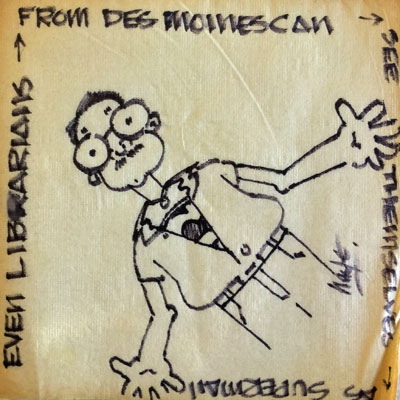
Sea Gull Cellar Bar Napkin Art, Jack Haye artist
Whatever the case, there is no free lunch as economists like to say. A drastic rollback of regulations is likely to lead eventually to more mess and less clean-up. It’s like telling my grandson to keep on dumping out those boxes and having fun and not to worry about picking things up after.
Environmental rules are being particularly hard hit. The New York Times recently reported on 60 Environmental Rules on the Way Out Under Trump and that was before offshore drilling was approved last week including along the California coast.

Sea Gull Cellar Bar Napkin Art, Nancy Barth artist
The upshot here is that economic growth is back on center stage while the Samuelson-Nordhaus idea of Net Economic Welfare has been set aside. It remains to be seen what the ultimate effects will be. It will probably take years to find out. By then the political winds may have changed. There is little doubt that the impact on lives outside of the crude economic measures is going to be negative. Yes, we can raise economic growth in the short run by ignoring the “bads” that come with it. We can sacrifice what we want in the long run for what we want right now. It’s the way most children think. But, we are adults, aren’t we?
Consider that Earth Overshoot Day (the day by which the human race has used up more natural resources than can be replenished in a year) occurred on August 2 last year, the earliest ever.
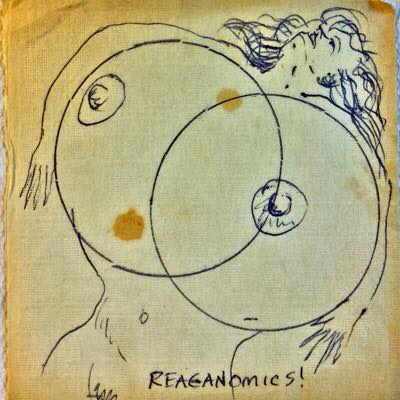
Sea Gull Cellar Bar Napkin Art, artist unknown
The United States makes an oversized contribution to the depletion of the world’s resources.
I’d like to write more on these interesting if depressing topics but I have to go and clean up my grandkid’s mess. Damn, I miss those regulations we imposed on our kids. They’re having a lot more fun. True. But the house, the house is always a MESS.

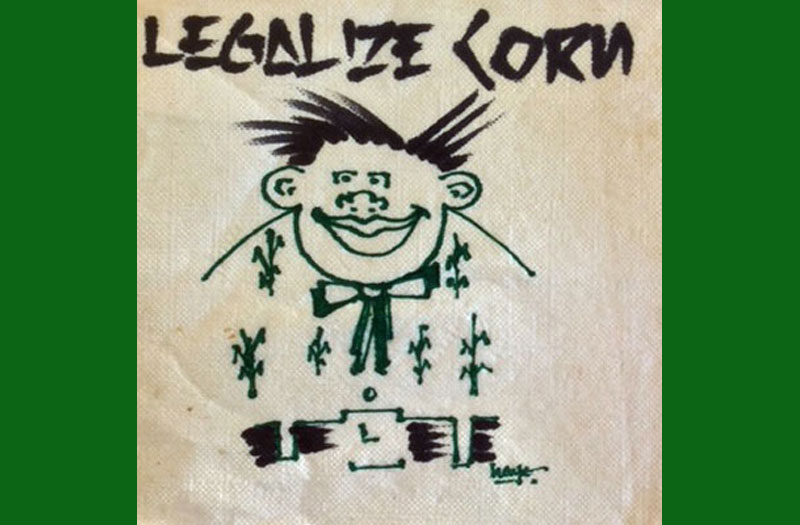
Remember the destruction of the earth-like planet Alderaan in “Star Wars?” A single blast from the Death Star annihilates it.
Trump would happily end life on earth rather than endure the loss of face that would be his if he were kicked out of office or otherwise lost his hold on being Emperor of the Universe. And I’m not even kidding.
Re. cleaning up your own mess: Early in his career Lenny Bruce did a bit about how policemen were invented. In the beginning, he said, there were so few people you could make a mess anywhere and no one would complain. Then, as the population grew, bad stuff started to happen, like people taking dumps on their neighbor’s front porch. This made everybody angry. One guy said, I’ve been taking dumps in this spot my whole life. The other guy said, yeah, but that was before I built my house. They just couldn’t work it out. Violence ensued.
So they had to invent policemen– to make sure no one crapped up his neighbor’s porch.
I wish I could write short succinct to the point stories like that. It would save me a lot of blog time. Thanks Gil. By the way, your new book 1967 was my favorite book of last year. Save me a few. I’ll pick them up next time I’m down for some friends.
I want to see it!!!